Economic Challenges in Nigeria
VerifiedAdded on 2019/12/03
|17
|3896
|236
Essay
AI Summary
The provided content is a collection of articles and essays discussing the economic challenges facing Nigeria. The topics include nationalism, development, corruption, and poverty. The articles highlight the country's struggle to achieve economic growth despite being rich in natural resources. They also explore the impact of oil prices on the economy, the importance of inclusive economic growth, and the need for public-private partnerships. The content includes references from various sources such as academic journals, online news outlets, and government reports.
Contribute Materials
Your contribution can guide someone’s learning journey. Share your
documents today.
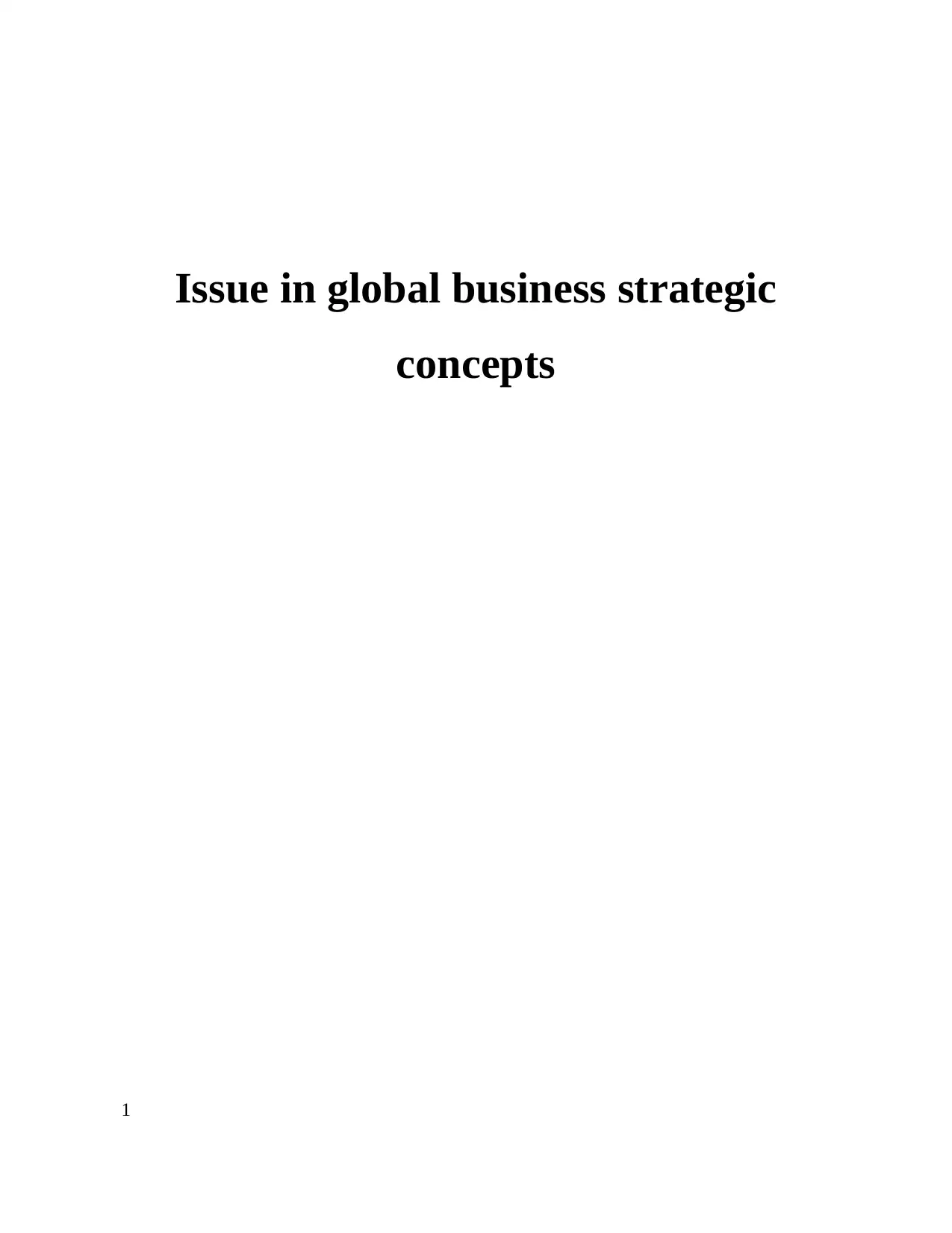
Issue in global business strategic
concepts
1
concepts
1
Secure Best Marks with AI Grader
Need help grading? Try our AI Grader for instant feedback on your assignments.
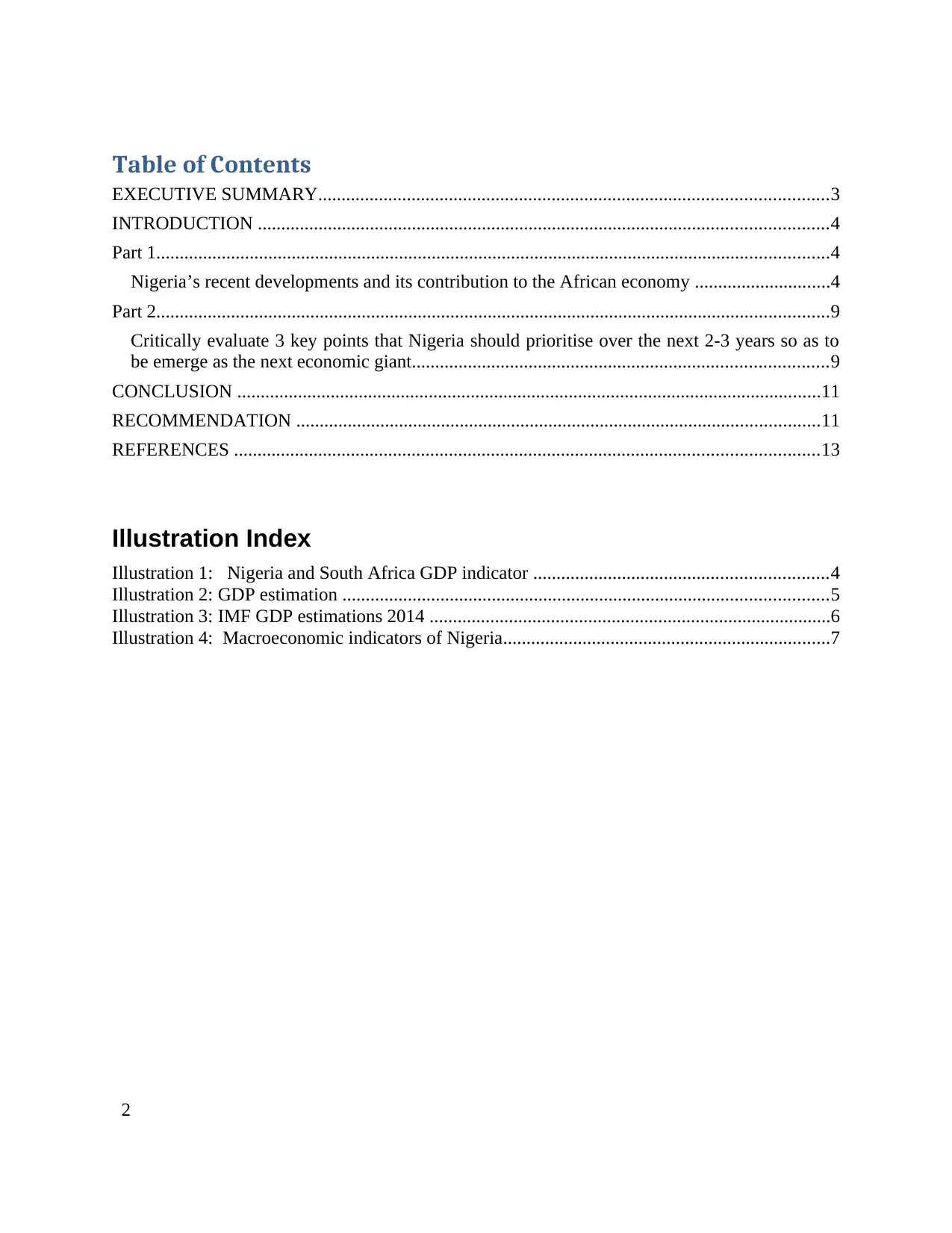
Table of Contents
EXECUTIVE SUMMARY.............................................................................................................3
INTRODUCTION ..........................................................................................................................4
Part 1................................................................................................................................................4
Nigeria’s recent developments and its contribution to the African economy .............................4
Part 2................................................................................................................................................9
Critically evaluate 3 key points that Nigeria should prioritise over the next 2-3 years so as to
be emerge as the next economic giant.........................................................................................9
CONCLUSION .............................................................................................................................11
RECOMMENDATION ................................................................................................................11
REFERENCES .............................................................................................................................13
Illustration Index
Illustration 1: Nigeria and South Africa GDP indicator ...............................................................4
Illustration 2: GDP estimation ........................................................................................................5
Illustration 3: IMF GDP estimations 2014 ......................................................................................6
Illustration 4: Macroeconomic indicators of Nigeria......................................................................7
2
EXECUTIVE SUMMARY.............................................................................................................3
INTRODUCTION ..........................................................................................................................4
Part 1................................................................................................................................................4
Nigeria’s recent developments and its contribution to the African economy .............................4
Part 2................................................................................................................................................9
Critically evaluate 3 key points that Nigeria should prioritise over the next 2-3 years so as to
be emerge as the next economic giant.........................................................................................9
CONCLUSION .............................................................................................................................11
RECOMMENDATION ................................................................................................................11
REFERENCES .............................................................................................................................13
Illustration Index
Illustration 1: Nigeria and South Africa GDP indicator ...............................................................4
Illustration 2: GDP estimation ........................................................................................................5
Illustration 3: IMF GDP estimations 2014 ......................................................................................6
Illustration 4: Macroeconomic indicators of Nigeria......................................................................7
2
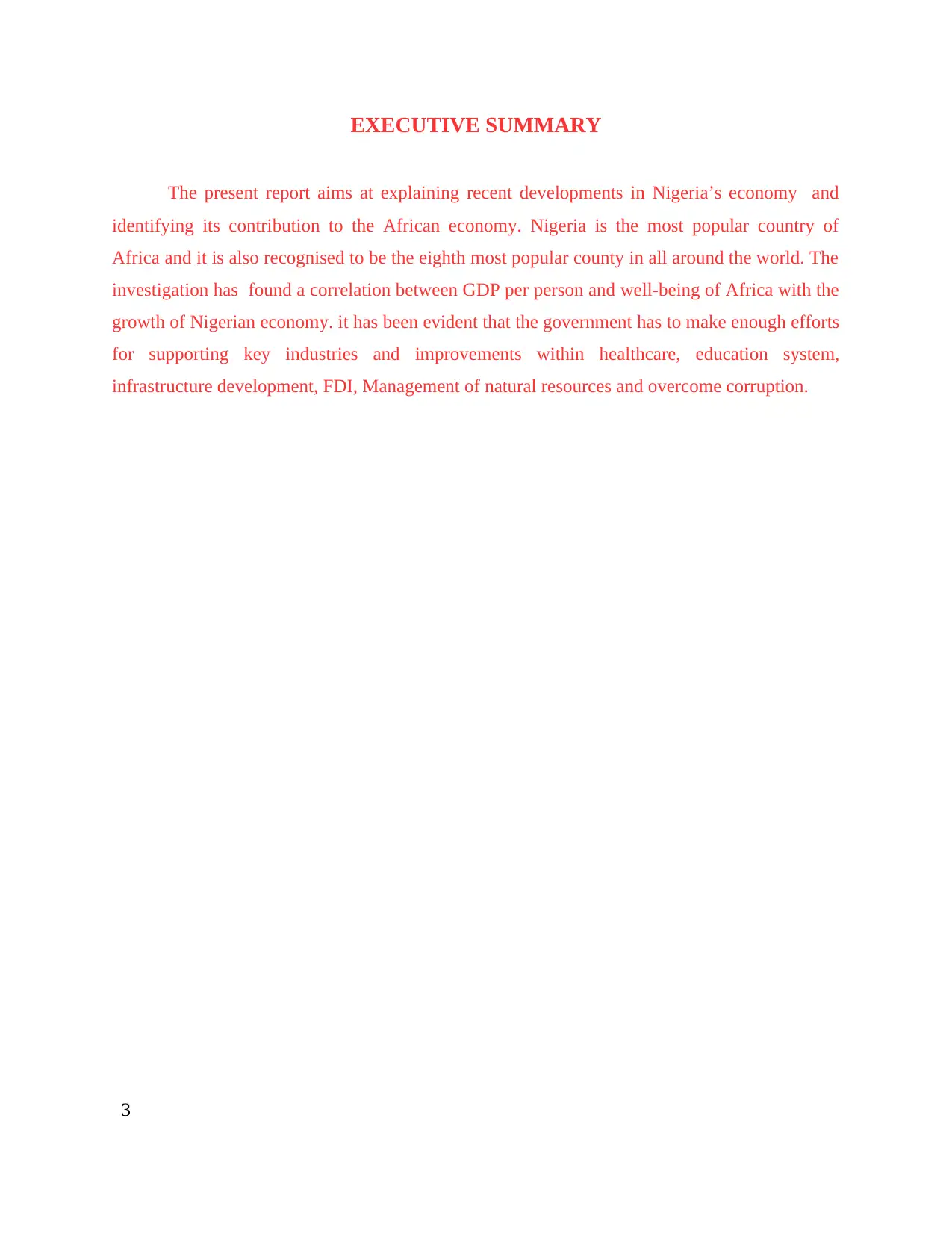
EXECUTIVE SUMMARY
The present report aims at explaining recent developments in Nigeria’s economy and
identifying its contribution to the African economy. Nigeria is the most popular country of
Africa and it is also recognised to be the eighth most popular county in all around the world. The
investigation has found a correlation between GDP per person and well-being of Africa with the
growth of Nigerian economy. it has been evident that the government has to make enough efforts
for supporting key industries and improvements within healthcare, education system,
infrastructure development, FDI, Management of natural resources and overcome corruption.
3
The present report aims at explaining recent developments in Nigeria’s economy and
identifying its contribution to the African economy. Nigeria is the most popular country of
Africa and it is also recognised to be the eighth most popular county in all around the world. The
investigation has found a correlation between GDP per person and well-being of Africa with the
growth of Nigerian economy. it has been evident that the government has to make enough efforts
for supporting key industries and improvements within healthcare, education system,
infrastructure development, FDI, Management of natural resources and overcome corruption.
3
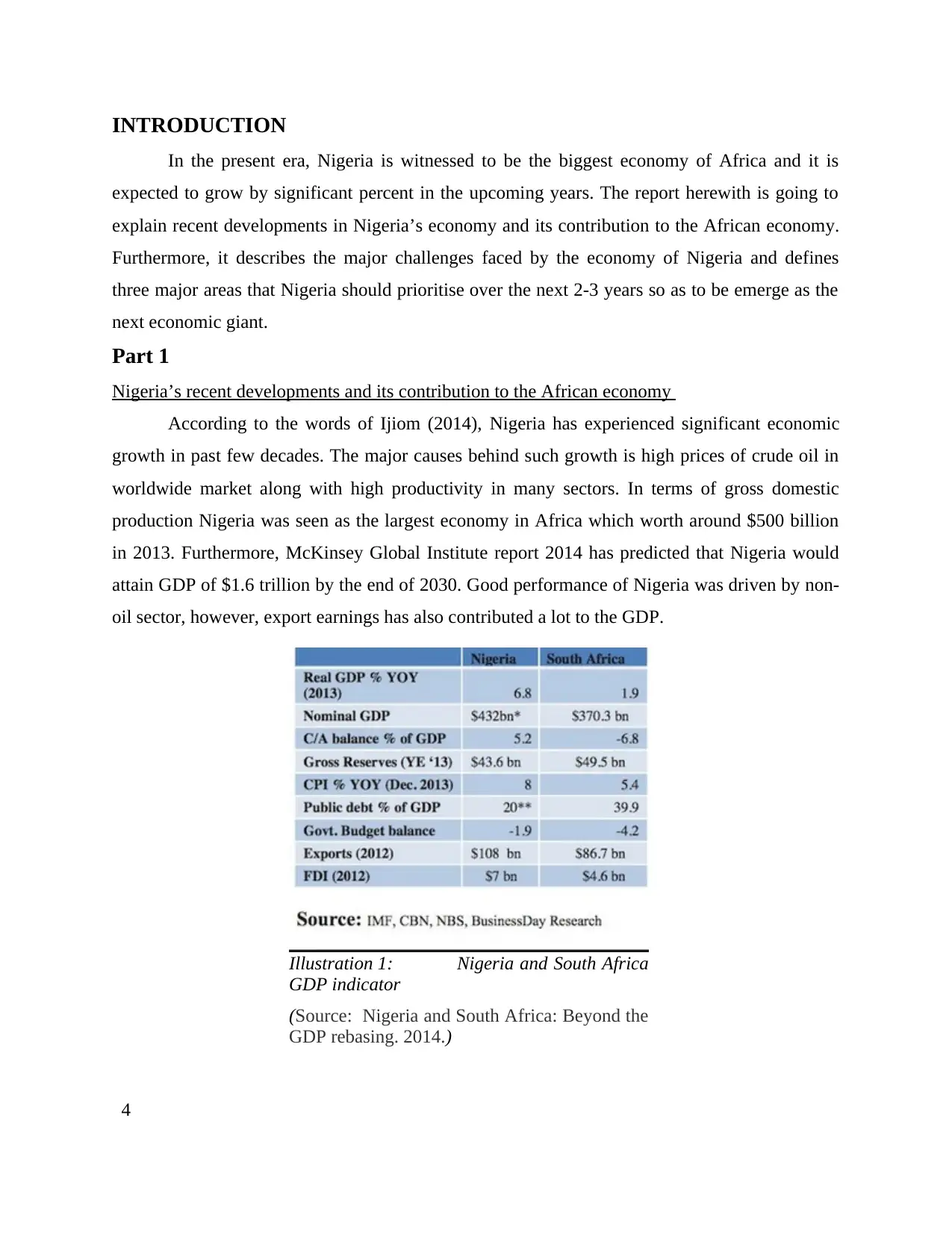
INTRODUCTION
In the present era, Nigeria is witnessed to be the biggest economy of Africa and it is
expected to grow by significant percent in the upcoming years. The report herewith is going to
explain recent developments in Nigeria’s economy and its contribution to the African economy.
Furthermore, it describes the major challenges faced by the economy of Nigeria and defines
three major areas that Nigeria should prioritise over the next 2-3 years so as to be emerge as the
next economic giant.
Part 1
Nigeria’s recent developments and its contribution to the African economy
According to the words of Ijiom (2014), Nigeria has experienced significant economic
growth in past few decades. The major causes behind such growth is high prices of crude oil in
worldwide market along with high productivity in many sectors. In terms of gross domestic
production Nigeria was seen as the largest economy in Africa which worth around $500 billion
in 2013. Furthermore, McKinsey Global Institute report 2014 has predicted that Nigeria would
attain GDP of $1.6 trillion by the end of 2030. Good performance of Nigeria was driven by non-
oil sector, however, export earnings has also contributed a lot to the GDP.
4
Illustration 1: Nigeria and South Africa
GDP indicator
(Source: Nigeria and South Africa: Beyond the
GDP rebasing. 2014.)
In the present era, Nigeria is witnessed to be the biggest economy of Africa and it is
expected to grow by significant percent in the upcoming years. The report herewith is going to
explain recent developments in Nigeria’s economy and its contribution to the African economy.
Furthermore, it describes the major challenges faced by the economy of Nigeria and defines
three major areas that Nigeria should prioritise over the next 2-3 years so as to be emerge as the
next economic giant.
Part 1
Nigeria’s recent developments and its contribution to the African economy
According to the words of Ijiom (2014), Nigeria has experienced significant economic
growth in past few decades. The major causes behind such growth is high prices of crude oil in
worldwide market along with high productivity in many sectors. In terms of gross domestic
production Nigeria was seen as the largest economy in Africa which worth around $500 billion
in 2013. Furthermore, McKinsey Global Institute report 2014 has predicted that Nigeria would
attain GDP of $1.6 trillion by the end of 2030. Good performance of Nigeria was driven by non-
oil sector, however, export earnings has also contributed a lot to the GDP.
4
Illustration 1: Nigeria and South Africa
GDP indicator
(Source: Nigeria and South Africa: Beyond the
GDP rebasing. 2014.)
Secure Best Marks with AI Grader
Need help grading? Try our AI Grader for instant feedback on your assignments.
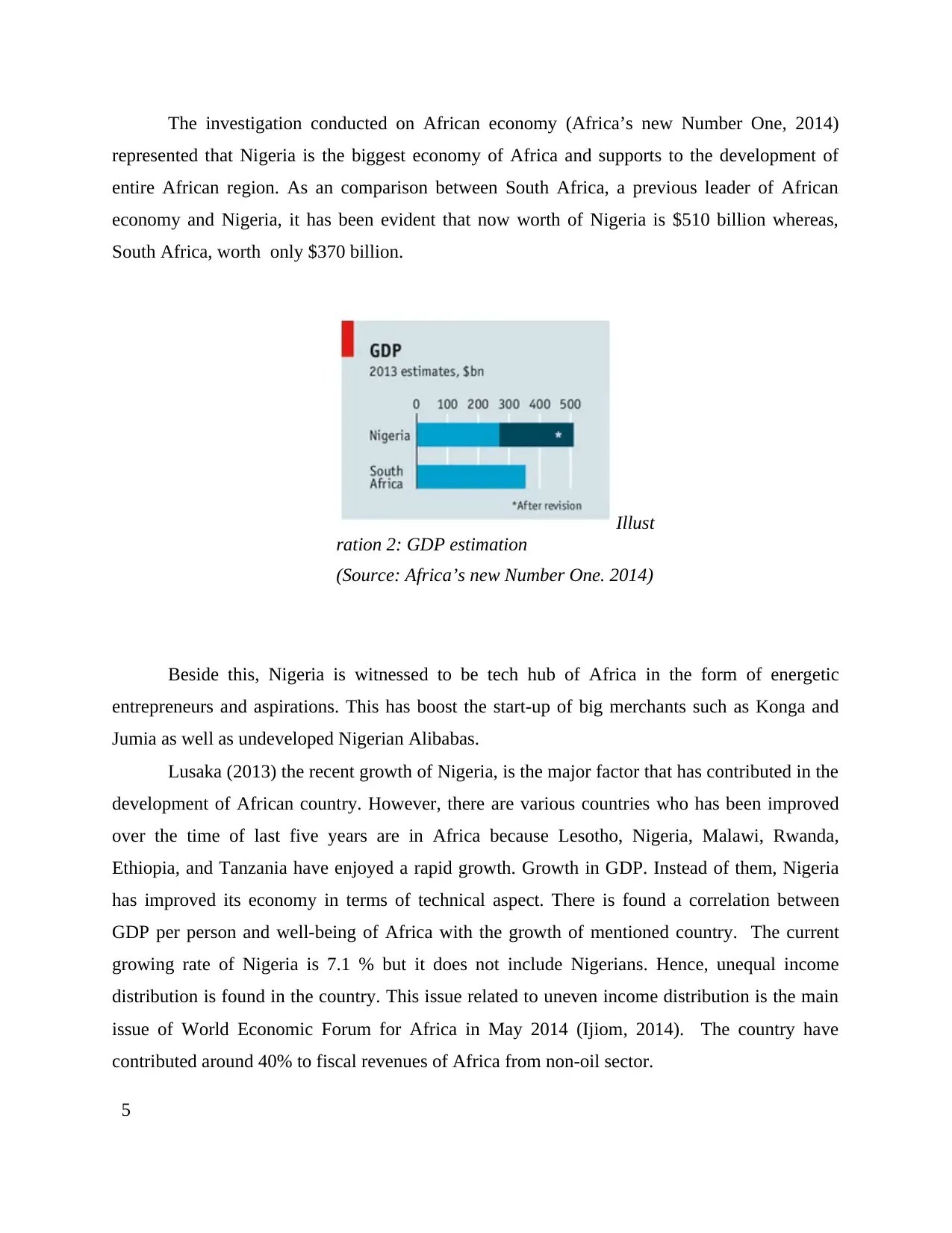
The investigation conducted on African economy (Africa’s new Number One, 2014)
represented that Nigeria is the biggest economy of Africa and supports to the development of
entire African region. As an comparison between South Africa, a previous leader of African
economy and Nigeria, it has been evident that now worth of Nigeria is $510 billion whereas,
South Africa, worth only $370 billion.
Beside this, Nigeria is witnessed to be tech hub of Africa in the form of energetic
entrepreneurs and aspirations. This has boost the start-up of big merchants such as Konga and
Jumia as well as undeveloped Nigerian Alibabas.
Lusaka (2013) the recent growth of Nigeria, is the major factor that has contributed in the
development of African country. However, there are various countries who has been improved
over the time of last five years are in Africa because Lesotho, Nigeria, Malawi, Rwanda,
Ethiopia, and Tanzania have enjoyed a rapid growth. Growth in GDP. Instead of them, Nigeria
has improved its economy in terms of technical aspect. There is found a correlation between
GDP per person and well-being of Africa with the growth of mentioned country. The current
growing rate of Nigeria is 7.1 % but it does not include Nigerians. Hence, unequal income
distribution is found in the country. This issue related to uneven income distribution is the main
issue of World Economic Forum for Africa in May 2014 (Ijiom, 2014). The country have
contributed around 40% to fiscal revenues of Africa from non-oil sector.
5
Illust
ration 2: GDP estimation
(Source: Africa’s new Number One. 2014)
represented that Nigeria is the biggest economy of Africa and supports to the development of
entire African region. As an comparison between South Africa, a previous leader of African
economy and Nigeria, it has been evident that now worth of Nigeria is $510 billion whereas,
South Africa, worth only $370 billion.
Beside this, Nigeria is witnessed to be tech hub of Africa in the form of energetic
entrepreneurs and aspirations. This has boost the start-up of big merchants such as Konga and
Jumia as well as undeveloped Nigerian Alibabas.
Lusaka (2013) the recent growth of Nigeria, is the major factor that has contributed in the
development of African country. However, there are various countries who has been improved
over the time of last five years are in Africa because Lesotho, Nigeria, Malawi, Rwanda,
Ethiopia, and Tanzania have enjoyed a rapid growth. Growth in GDP. Instead of them, Nigeria
has improved its economy in terms of technical aspect. There is found a correlation between
GDP per person and well-being of Africa with the growth of mentioned country. The current
growing rate of Nigeria is 7.1 % but it does not include Nigerians. Hence, unequal income
distribution is found in the country. This issue related to uneven income distribution is the main
issue of World Economic Forum for Africa in May 2014 (Ijiom, 2014). The country have
contributed around 40% to fiscal revenues of Africa from non-oil sector.
5
Illust
ration 2: GDP estimation
(Source: Africa’s new Number One. 2014)
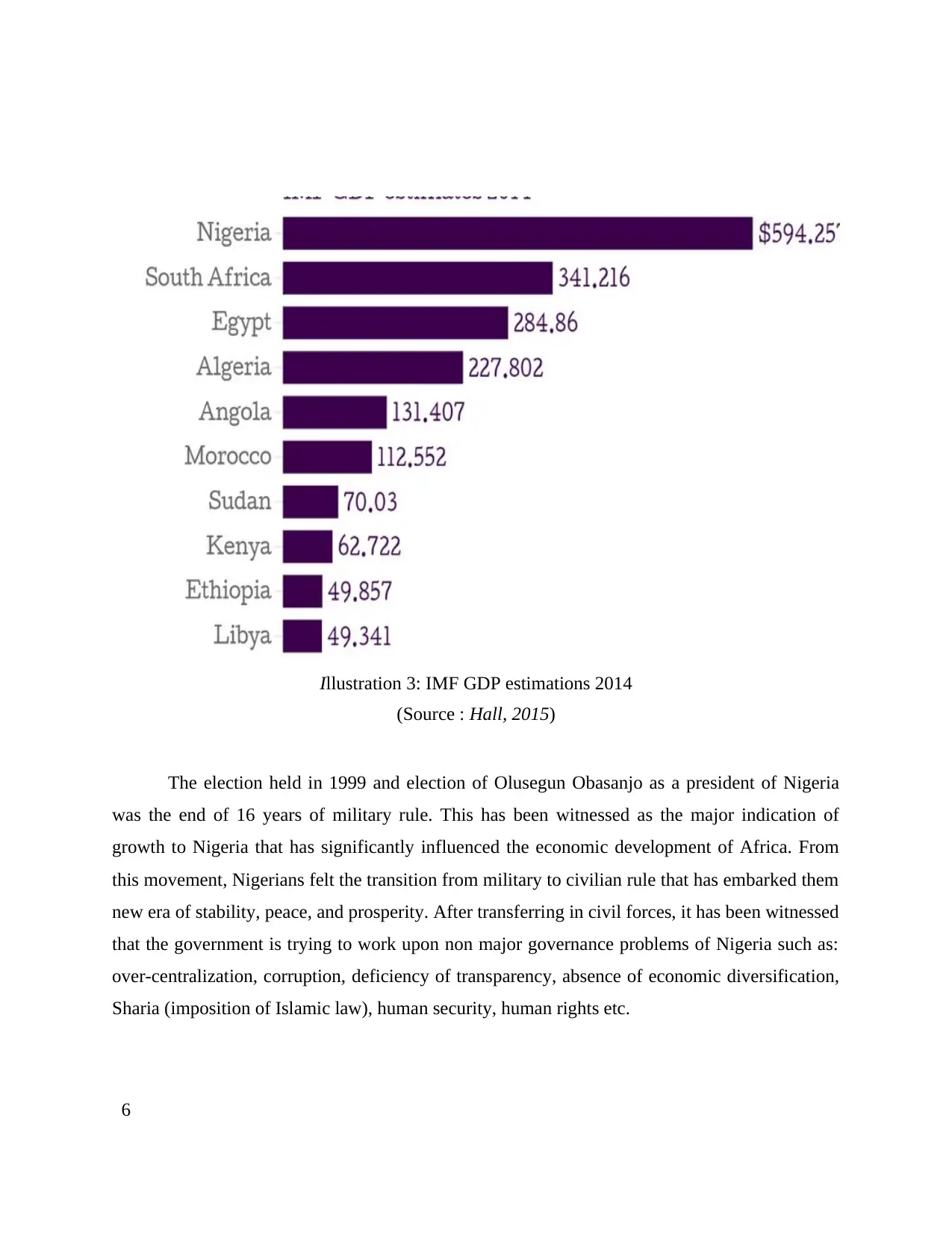
The election held in 1999 and election of Olusegun Obasanjo as a president of Nigeria
was the end of 16 years of military rule. This has been witnessed as the major indication of
growth to Nigeria that has significantly influenced the economic development of Africa. From
this movement, Nigerians felt the transition from military to civilian rule that has embarked them
new era of stability, peace, and prosperity. After transferring in civil forces, it has been witnessed
that the government is trying to work upon non major governance problems of Nigeria such as:
over-centralization, corruption, deficiency of transparency, absence of economic diversification,
Sharia (imposition of Islamic law), human security, human rights etc.
6
Illustration 3: IMF GDP estimations 2014
(Source : Hall, 2015)
was the end of 16 years of military rule. This has been witnessed as the major indication of
growth to Nigeria that has significantly influenced the economic development of Africa. From
this movement, Nigerians felt the transition from military to civilian rule that has embarked them
new era of stability, peace, and prosperity. After transferring in civil forces, it has been witnessed
that the government is trying to work upon non major governance problems of Nigeria such as:
over-centralization, corruption, deficiency of transparency, absence of economic diversification,
Sharia (imposition of Islamic law), human security, human rights etc.
6
Illustration 3: IMF GDP estimations 2014
(Source : Hall, 2015)
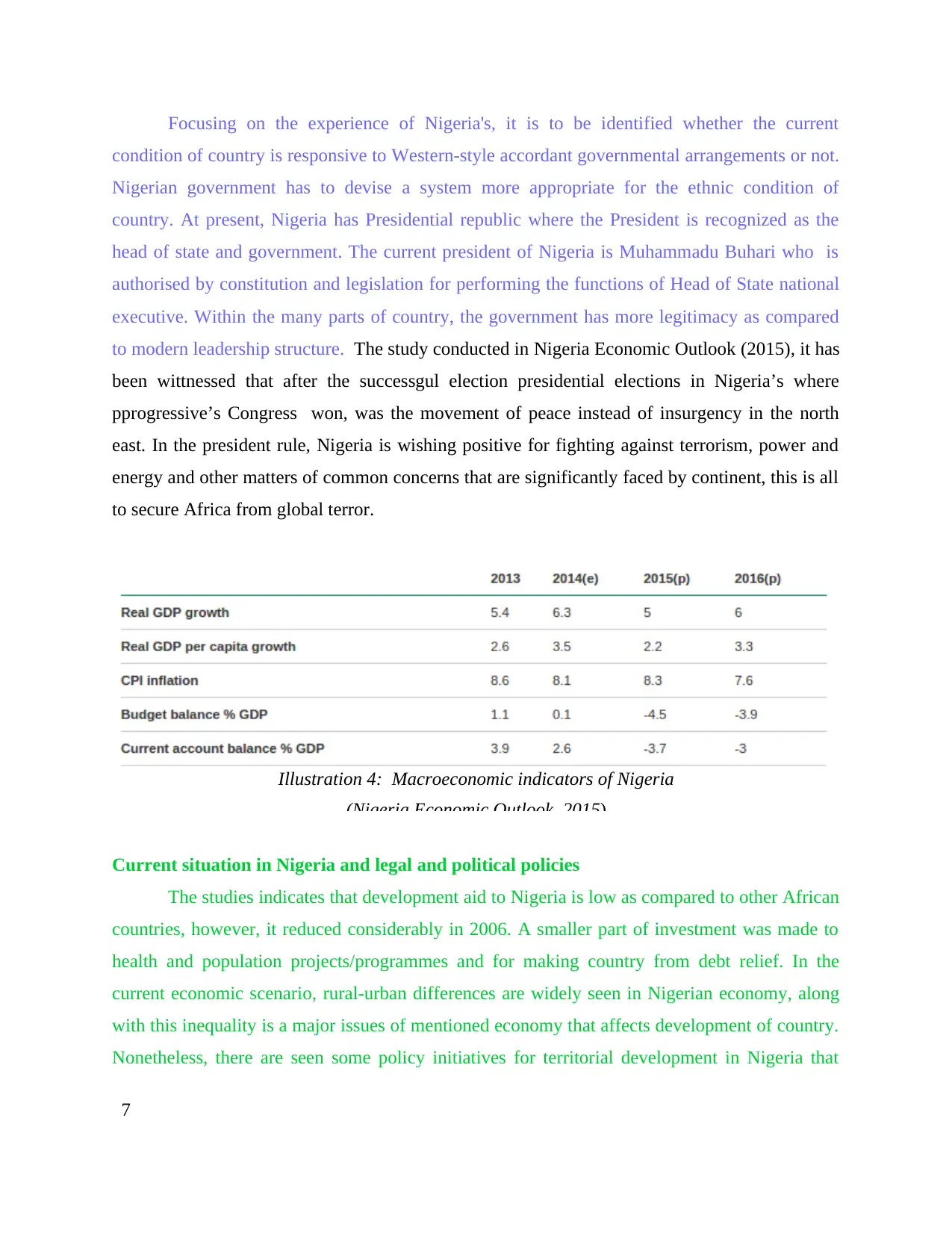
Focusing on the experience of Nigeria's, it is to be identified whether the current
condition of country is responsive to Western-style accordant governmental arrangements or not.
Nigerian government has to devise a system more appropriate for the ethnic condition of
country. At present, Nigeria has Presidential republic where the President is recognized as the
head of state and government. The current president of Nigeria is Muhammadu Buhari who is
authorised by constitution and legislation for performing the functions of Head of State national
executive. Within the many parts of country, the government has more legitimacy as compared
to modern leadership structure. The study conducted in Nigeria Economic Outlook (2015), it has
been wittnessed that after the successgul election presidential elections in Nigeria’s where
pprogressive’s Congress won, was the movement of peace instead of insurgency in the north
east. In the president rule, Nigeria is wishing positive for fighting against terrorism, power and
energy and other matters of common concerns that are significantly faced by continent, this is all
to secure Africa from global terror.
Current situation in Nigeria and legal and political policies
The studies indicates that development aid to Nigeria is low as compared to other African
countries, however, it reduced considerably in 2006. A smaller part of investment was made to
health and population projects/programmes and for making country from debt relief. In the
current economic scenario, rural-urban differences are widely seen in Nigerian economy, along
with this inequality is a major issues of mentioned economy that affects development of country.
Nonetheless, there are seen some policy initiatives for territorial development in Nigeria that
7
Illustration 4: Macroeconomic indicators of Nigeria
(Nigeria Economic Outlook. 2015)
condition of country is responsive to Western-style accordant governmental arrangements or not.
Nigerian government has to devise a system more appropriate for the ethnic condition of
country. At present, Nigeria has Presidential republic where the President is recognized as the
head of state and government. The current president of Nigeria is Muhammadu Buhari who is
authorised by constitution and legislation for performing the functions of Head of State national
executive. Within the many parts of country, the government has more legitimacy as compared
to modern leadership structure. The study conducted in Nigeria Economic Outlook (2015), it has
been wittnessed that after the successgul election presidential elections in Nigeria’s where
pprogressive’s Congress won, was the movement of peace instead of insurgency in the north
east. In the president rule, Nigeria is wishing positive for fighting against terrorism, power and
energy and other matters of common concerns that are significantly faced by continent, this is all
to secure Africa from global terror.
Current situation in Nigeria and legal and political policies
The studies indicates that development aid to Nigeria is low as compared to other African
countries, however, it reduced considerably in 2006. A smaller part of investment was made to
health and population projects/programmes and for making country from debt relief. In the
current economic scenario, rural-urban differences are widely seen in Nigerian economy, along
with this inequality is a major issues of mentioned economy that affects development of country.
Nonetheless, there are seen some policy initiatives for territorial development in Nigeria that
7
Illustration 4: Macroeconomic indicators of Nigeria
(Nigeria Economic Outlook. 2015)
Paraphrase This Document
Need a fresh take? Get an instant paraphrase of this document with our AI Paraphraser
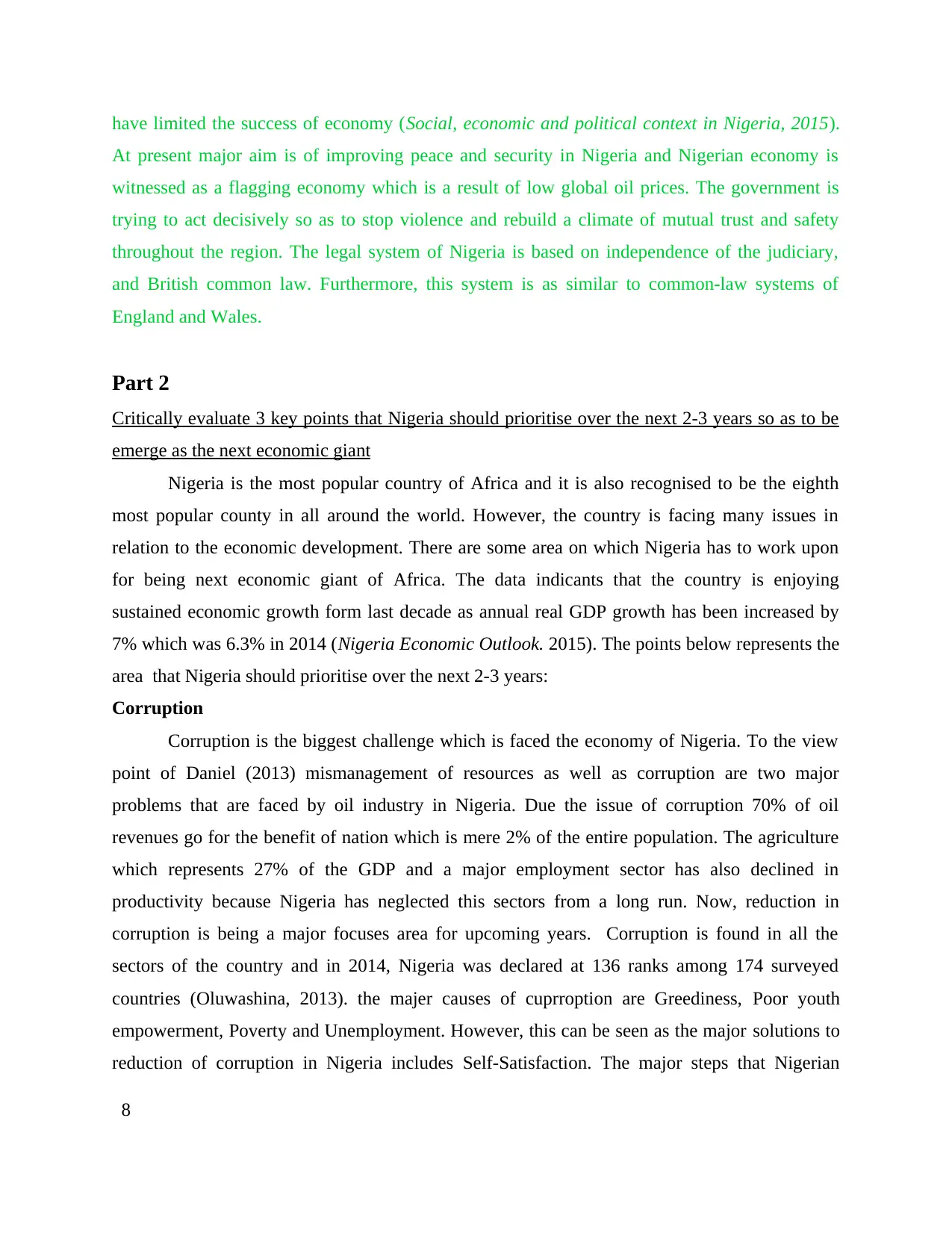
have limited the success of economy (Social, economic and political context in Nigeria, 2015).
At present major aim is of improving peace and security in Nigeria and Nigerian economy is
witnessed as a flagging economy which is a result of low global oil prices. The government is
trying to act decisively so as to stop violence and rebuild a climate of mutual trust and safety
throughout the region. The legal system of Nigeria is based on independence of the judiciary,
and British common law. Furthermore, this system is as similar to common-law systems of
England and Wales.
Part 2
Critically evaluate 3 key points that Nigeria should prioritise over the next 2-3 years so as to be
emerge as the next economic giant
Nigeria is the most popular country of Africa and it is also recognised to be the eighth
most popular county in all around the world. However, the country is facing many issues in
relation to the economic development. There are some area on which Nigeria has to work upon
for being next economic giant of Africa. The data indicants that the country is enjoying
sustained economic growth form last decade as annual real GDP growth has been increased by
7% which was 6.3% in 2014 (Nigeria Economic Outlook. 2015). The points below represents the
area that Nigeria should prioritise over the next 2-3 years:
Corruption
Corruption is the biggest challenge which is faced the economy of Nigeria. To the view
point of Daniel (2013) mismanagement of resources as well as corruption are two major
problems that are faced by oil industry in Nigeria. Due the issue of corruption 70% of oil
revenues go for the benefit of nation which is mere 2% of the entire population. The agriculture
which represents 27% of the GDP and a major employment sector has also declined in
productivity because Nigeria has neglected this sectors from a long run. Now, reduction in
corruption is being a major focuses area for upcoming years. Corruption is found in all the
sectors of the country and in 2014, Nigeria was declared at 136 ranks among 174 surveyed
countries (Oluwashina, 2013). the majer causes of cuprroption are Greediness, Poor youth
empowerment, Poverty and Unemployment. However, this can be seen as the major solutions to
reduction of corruption in Nigeria includes Self-Satisfaction. The major steps that Nigerian
8
At present major aim is of improving peace and security in Nigeria and Nigerian economy is
witnessed as a flagging economy which is a result of low global oil prices. The government is
trying to act decisively so as to stop violence and rebuild a climate of mutual trust and safety
throughout the region. The legal system of Nigeria is based on independence of the judiciary,
and British common law. Furthermore, this system is as similar to common-law systems of
England and Wales.
Part 2
Critically evaluate 3 key points that Nigeria should prioritise over the next 2-3 years so as to be
emerge as the next economic giant
Nigeria is the most popular country of Africa and it is also recognised to be the eighth
most popular county in all around the world. However, the country is facing many issues in
relation to the economic development. There are some area on which Nigeria has to work upon
for being next economic giant of Africa. The data indicants that the country is enjoying
sustained economic growth form last decade as annual real GDP growth has been increased by
7% which was 6.3% in 2014 (Nigeria Economic Outlook. 2015). The points below represents the
area that Nigeria should prioritise over the next 2-3 years:
Corruption
Corruption is the biggest challenge which is faced the economy of Nigeria. To the view
point of Daniel (2013) mismanagement of resources as well as corruption are two major
problems that are faced by oil industry in Nigeria. Due the issue of corruption 70% of oil
revenues go for the benefit of nation which is mere 2% of the entire population. The agriculture
which represents 27% of the GDP and a major employment sector has also declined in
productivity because Nigeria has neglected this sectors from a long run. Now, reduction in
corruption is being a major focuses area for upcoming years. Corruption is found in all the
sectors of the country and in 2014, Nigeria was declared at 136 ranks among 174 surveyed
countries (Oluwashina, 2013). the majer causes of cuprroption are Greediness, Poor youth
empowerment, Poverty and Unemployment. However, this can be seen as the major solutions to
reduction of corruption in Nigeria includes Self-Satisfaction. The major steps that Nigerian
8
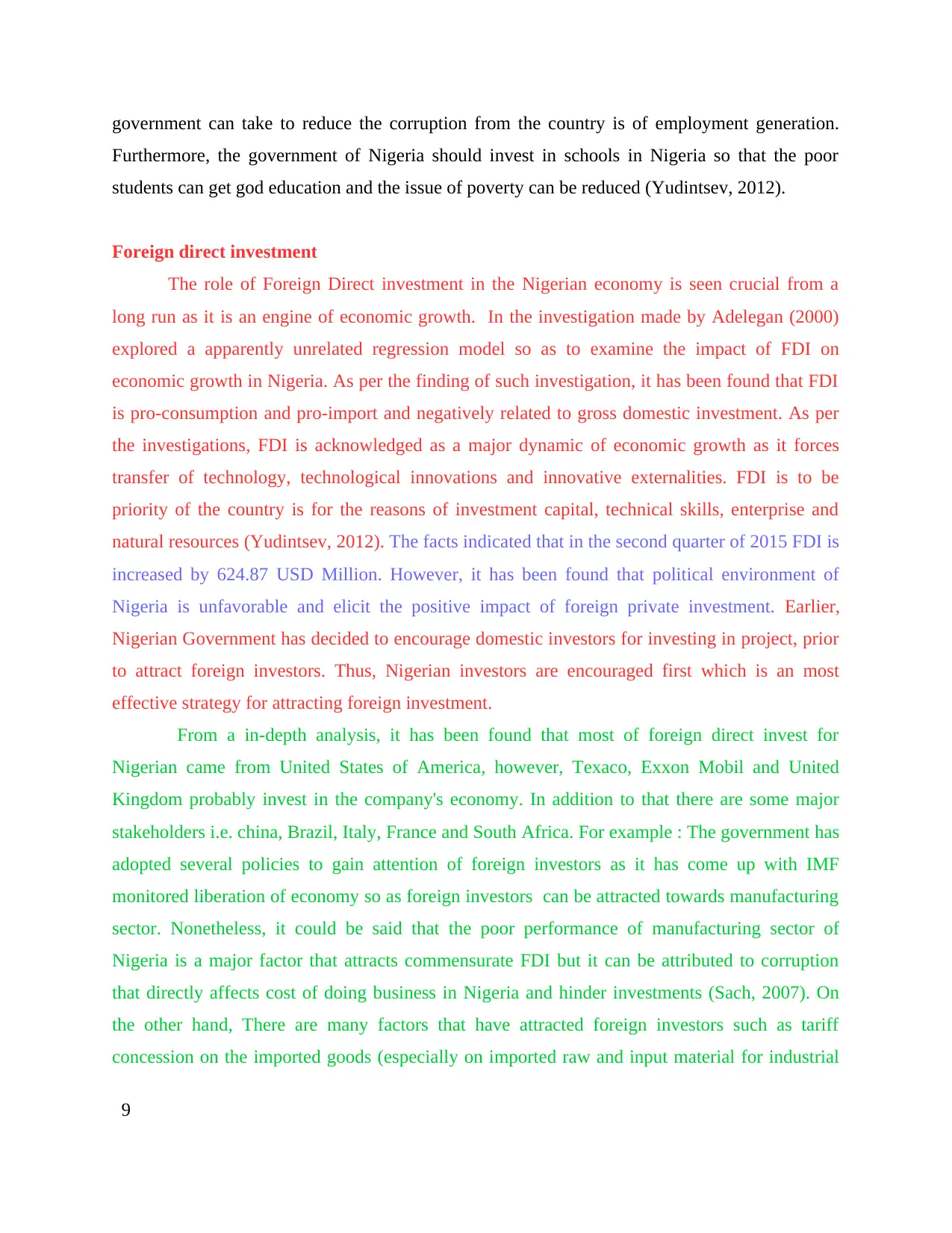
government can take to reduce the corruption from the country is of employment generation.
Furthermore, the government of Nigeria should invest in schools in Nigeria so that the poor
students can get god education and the issue of poverty can be reduced (Yudintsev, 2012).
Foreign direct investment
The role of Foreign Direct investment in the Nigerian economy is seen crucial from a
long run as it is an engine of economic growth. In the investigation made by Adelegan (2000)
explored a apparently unrelated regression model so as to examine the impact of FDI on
economic growth in Nigeria. As per the finding of such investigation, it has been found that FDI
is pro-consumption and pro-import and negatively related to gross domestic investment. As per
the investigations, FDI is acknowledged as a major dynamic of economic growth as it forces
transfer of technology, technological innovations and innovative externalities. FDI is to be
priority of the country is for the reasons of investment capital, technical skills, enterprise and
natural resources (Yudintsev, 2012). The facts indicated that in the second quarter of 2015 FDI is
increased by 624.87 USD Million. However, it has been found that political environment of
Nigeria is unfavorable and elicit the positive impact of foreign private investment. Earlier,
Nigerian Government has decided to encourage domestic investors for investing in project, prior
to attract foreign investors. Thus, Nigerian investors are encouraged first which is an most
effective strategy for attracting foreign investment.
From a in-depth analysis, it has been found that most of foreign direct invest for
Nigerian came from United States of America, however, Texaco, Exxon Mobil and United
Kingdom probably invest in the company's economy. In addition to that there are some major
stakeholders i.e. china, Brazil, Italy, France and South Africa. For example : The government has
adopted several policies to gain attention of foreign investors as it has come up with IMF
monitored liberation of economy so as foreign investors can be attracted towards manufacturing
sector. Nonetheless, it could be said that the poor performance of manufacturing sector of
Nigeria is a major factor that attracts commensurate FDI but it can be attributed to corruption
that directly affects cost of doing business in Nigeria and hinder investments (Sach, 2007). On
the other hand, There are many factors that have attracted foreign investors such as tariff
concession on the imported goods (especially on imported raw and input material for industrial
9
Furthermore, the government of Nigeria should invest in schools in Nigeria so that the poor
students can get god education and the issue of poverty can be reduced (Yudintsev, 2012).
Foreign direct investment
The role of Foreign Direct investment in the Nigerian economy is seen crucial from a
long run as it is an engine of economic growth. In the investigation made by Adelegan (2000)
explored a apparently unrelated regression model so as to examine the impact of FDI on
economic growth in Nigeria. As per the finding of such investigation, it has been found that FDI
is pro-consumption and pro-import and negatively related to gross domestic investment. As per
the investigations, FDI is acknowledged as a major dynamic of economic growth as it forces
transfer of technology, technological innovations and innovative externalities. FDI is to be
priority of the country is for the reasons of investment capital, technical skills, enterprise and
natural resources (Yudintsev, 2012). The facts indicated that in the second quarter of 2015 FDI is
increased by 624.87 USD Million. However, it has been found that political environment of
Nigeria is unfavorable and elicit the positive impact of foreign private investment. Earlier,
Nigerian Government has decided to encourage domestic investors for investing in project, prior
to attract foreign investors. Thus, Nigerian investors are encouraged first which is an most
effective strategy for attracting foreign investment.
From a in-depth analysis, it has been found that most of foreign direct invest for
Nigerian came from United States of America, however, Texaco, Exxon Mobil and United
Kingdom probably invest in the company's economy. In addition to that there are some major
stakeholders i.e. china, Brazil, Italy, France and South Africa. For example : The government has
adopted several policies to gain attention of foreign investors as it has come up with IMF
monitored liberation of economy so as foreign investors can be attracted towards manufacturing
sector. Nonetheless, it could be said that the poor performance of manufacturing sector of
Nigeria is a major factor that attracts commensurate FDI but it can be attributed to corruption
that directly affects cost of doing business in Nigeria and hinder investments (Sach, 2007). On
the other hand, There are many factors that have attracted foreign investors such as tariff
concession on the imported goods (especially on imported raw and input material for industrial
9
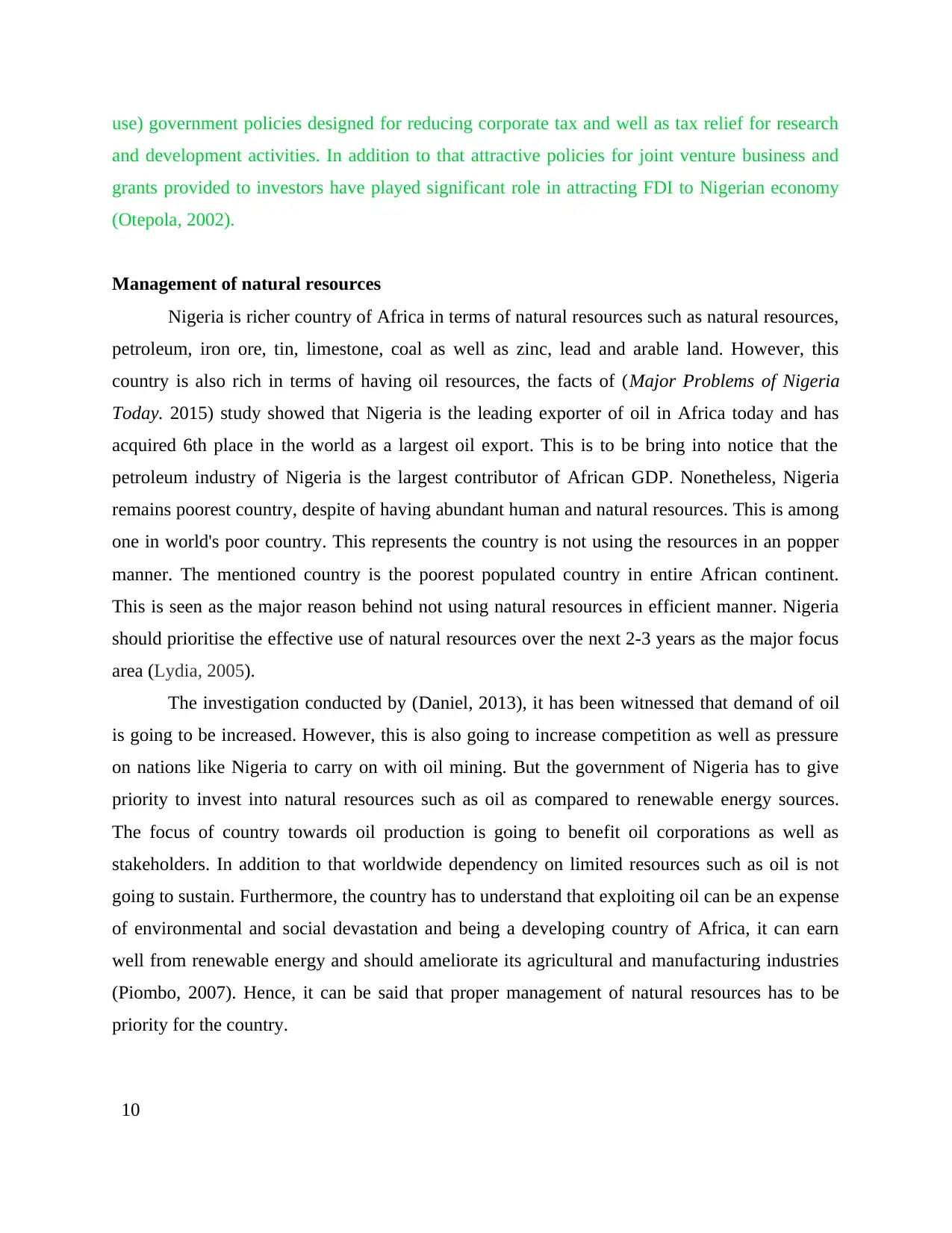
use) government policies designed for reducing corporate tax and well as tax relief for research
and development activities. In addition to that attractive policies for joint venture business and
grants provided to investors have played significant role in attracting FDI to Nigerian economy
(Otepola, 2002).
Management of natural resources
Nigeria is richer country of Africa in terms of natural resources such as natural resources,
petroleum, iron ore, tin, limestone, coal as well as zinc, lead and arable land. However, this
country is also rich in terms of having oil resources, the facts of (Major Problems of Nigeria
Today. 2015) study showed that Nigeria is the leading exporter of oil in Africa today and has
acquired 6th place in the world as a largest oil export. This is to be bring into notice that the
petroleum industry of Nigeria is the largest contributor of African GDP. Nonetheless, Nigeria
remains poorest country, despite of having abundant human and natural resources. This is among
one in world's poor country. This represents the country is not using the resources in an popper
manner. The mentioned country is the poorest populated country in entire African continent.
This is seen as the major reason behind not using natural resources in efficient manner. Nigeria
should prioritise the effective use of natural resources over the next 2-3 years as the major focus
area (Lydia, 2005).
The investigation conducted by (Daniel, 2013), it has been witnessed that demand of oil
is going to be increased. However, this is also going to increase competition as well as pressure
on nations like Nigeria to carry on with oil mining. But the government of Nigeria has to give
priority to invest into natural resources such as oil as compared to renewable energy sources.
The focus of country towards oil production is going to benefit oil corporations as well as
stakeholders. In addition to that worldwide dependency on limited resources such as oil is not
going to sustain. Furthermore, the country has to understand that exploiting oil can be an expense
of environmental and social devastation and being a developing country of Africa, it can earn
well from renewable energy and should ameliorate its agricultural and manufacturing industries
(Piombo, 2007). Hence, it can be said that proper management of natural resources has to be
priority for the country.
10
and development activities. In addition to that attractive policies for joint venture business and
grants provided to investors have played significant role in attracting FDI to Nigerian economy
(Otepola, 2002).
Management of natural resources
Nigeria is richer country of Africa in terms of natural resources such as natural resources,
petroleum, iron ore, tin, limestone, coal as well as zinc, lead and arable land. However, this
country is also rich in terms of having oil resources, the facts of (Major Problems of Nigeria
Today. 2015) study showed that Nigeria is the leading exporter of oil in Africa today and has
acquired 6th place in the world as a largest oil export. This is to be bring into notice that the
petroleum industry of Nigeria is the largest contributor of African GDP. Nonetheless, Nigeria
remains poorest country, despite of having abundant human and natural resources. This is among
one in world's poor country. This represents the country is not using the resources in an popper
manner. The mentioned country is the poorest populated country in entire African continent.
This is seen as the major reason behind not using natural resources in efficient manner. Nigeria
should prioritise the effective use of natural resources over the next 2-3 years as the major focus
area (Lydia, 2005).
The investigation conducted by (Daniel, 2013), it has been witnessed that demand of oil
is going to be increased. However, this is also going to increase competition as well as pressure
on nations like Nigeria to carry on with oil mining. But the government of Nigeria has to give
priority to invest into natural resources such as oil as compared to renewable energy sources.
The focus of country towards oil production is going to benefit oil corporations as well as
stakeholders. In addition to that worldwide dependency on limited resources such as oil is not
going to sustain. Furthermore, the country has to understand that exploiting oil can be an expense
of environmental and social devastation and being a developing country of Africa, it can earn
well from renewable energy and should ameliorate its agricultural and manufacturing industries
(Piombo, 2007). Hence, it can be said that proper management of natural resources has to be
priority for the country.
10
Secure Best Marks with AI Grader
Need help grading? Try our AI Grader for instant feedback on your assignments.
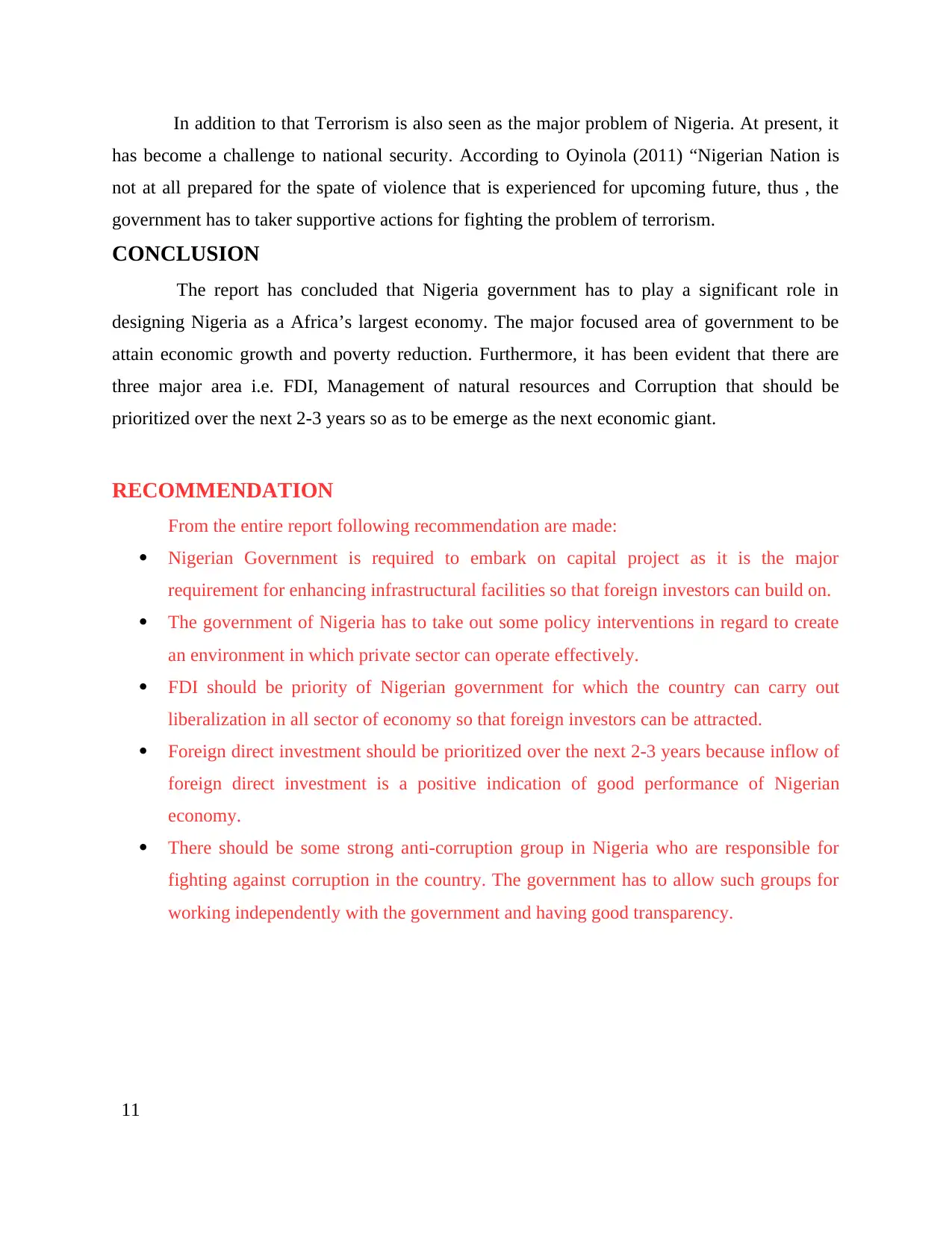
In addition to that Terrorism is also seen as the major problem of Nigeria. At present, it
has become a challenge to national security. According to Oyinola (2011) “Nigerian Nation is
not at all prepared for the spate of violence that is experienced for upcoming future, thus , the
government has to taker supportive actions for fighting the problem of terrorism.
CONCLUSION
The report has concluded that Nigeria government has to play a significant role in
designing Nigeria as a Africa’s largest economy. The major focused area of government to be
attain economic growth and poverty reduction. Furthermore, it has been evident that there are
three major area i.e. FDI, Management of natural resources and Corruption that should be
prioritized over the next 2-3 years so as to be emerge as the next economic giant.
RECOMMENDATION
From the entire report following recommendation are made:
Nigerian Government is required to embark on capital project as it is the major
requirement for enhancing infrastructural facilities so that foreign investors can build on.
The government of Nigeria has to take out some policy interventions in regard to create
an environment in which private sector can operate effectively.
FDI should be priority of Nigerian government for which the country can carry out
liberalization in all sector of economy so that foreign investors can be attracted.
Foreign direct investment should be prioritized over the next 2-3 years because inflow of
foreign direct investment is a positive indication of good performance of Nigerian
economy.
There should be some strong anti-corruption group in Nigeria who are responsible for
fighting against corruption in the country. The government has to allow such groups for
working independently with the government and having good transparency.
11
has become a challenge to national security. According to Oyinola (2011) “Nigerian Nation is
not at all prepared for the spate of violence that is experienced for upcoming future, thus , the
government has to taker supportive actions for fighting the problem of terrorism.
CONCLUSION
The report has concluded that Nigeria government has to play a significant role in
designing Nigeria as a Africa’s largest economy. The major focused area of government to be
attain economic growth and poverty reduction. Furthermore, it has been evident that there are
three major area i.e. FDI, Management of natural resources and Corruption that should be
prioritized over the next 2-3 years so as to be emerge as the next economic giant.
RECOMMENDATION
From the entire report following recommendation are made:
Nigerian Government is required to embark on capital project as it is the major
requirement for enhancing infrastructural facilities so that foreign investors can build on.
The government of Nigeria has to take out some policy interventions in regard to create
an environment in which private sector can operate effectively.
FDI should be priority of Nigerian government for which the country can carry out
liberalization in all sector of economy so that foreign investors can be attracted.
Foreign direct investment should be prioritized over the next 2-3 years because inflow of
foreign direct investment is a positive indication of good performance of Nigerian
economy.
There should be some strong anti-corruption group in Nigeria who are responsible for
fighting against corruption in the country. The government has to allow such groups for
working independently with the government and having good transparency.
11
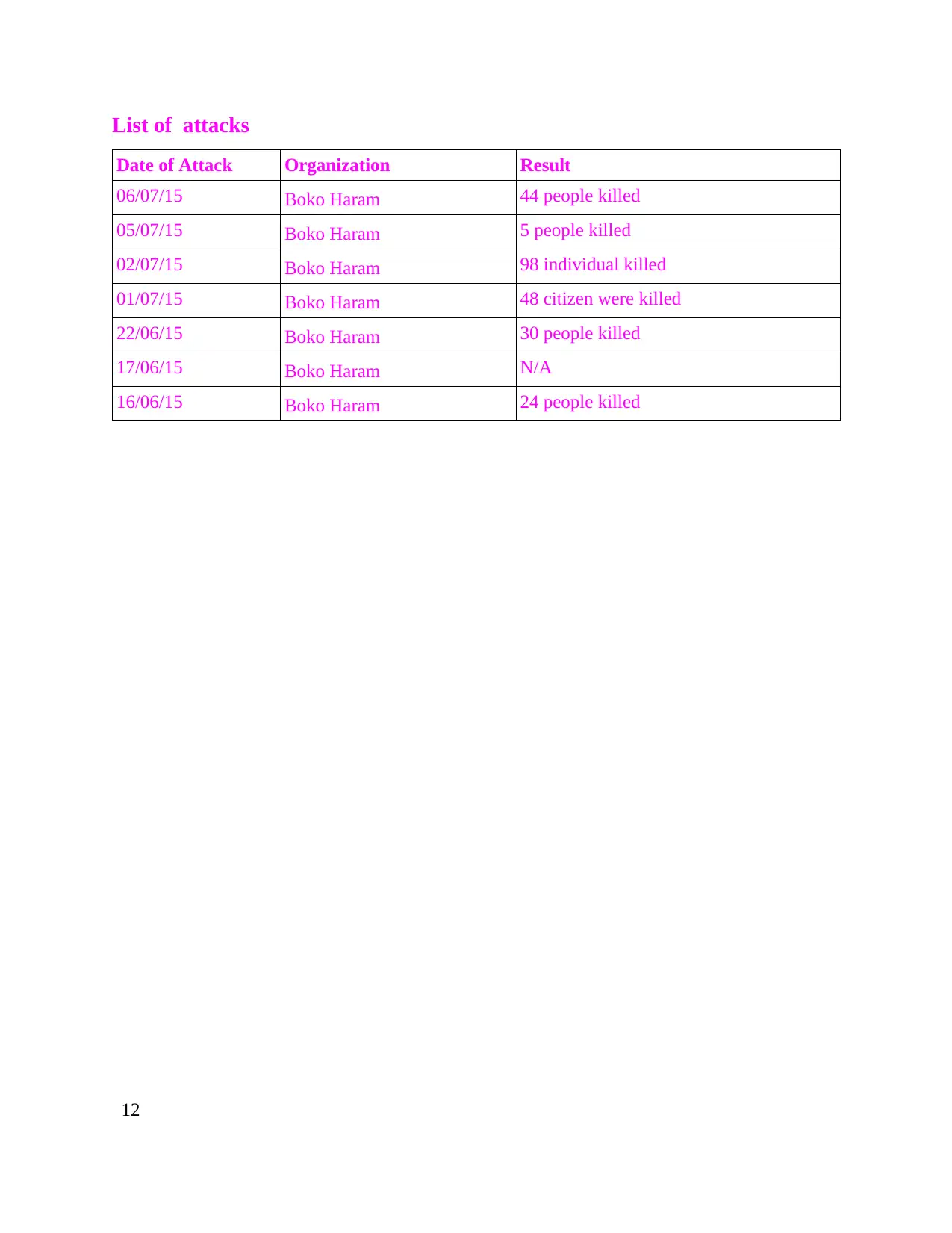
List of attacks
Date of Attack Organization Result
06/07/15 Boko Haram 44 people killed
05/07/15 Boko Haram 5 people killed
02/07/15 Boko Haram 98 individual killed
01/07/15 Boko Haram 48 citizen were killed
22/06/15 Boko Haram 30 people killed
17/06/15 Boko Haram N/A
16/06/15 Boko Haram 24 people killed
12
Date of Attack Organization Result
06/07/15 Boko Haram 44 people killed
05/07/15 Boko Haram 5 people killed
02/07/15 Boko Haram 98 individual killed
01/07/15 Boko Haram 48 citizen were killed
22/06/15 Boko Haram 30 people killed
17/06/15 Boko Haram N/A
16/06/15 Boko Haram 24 people killed
12
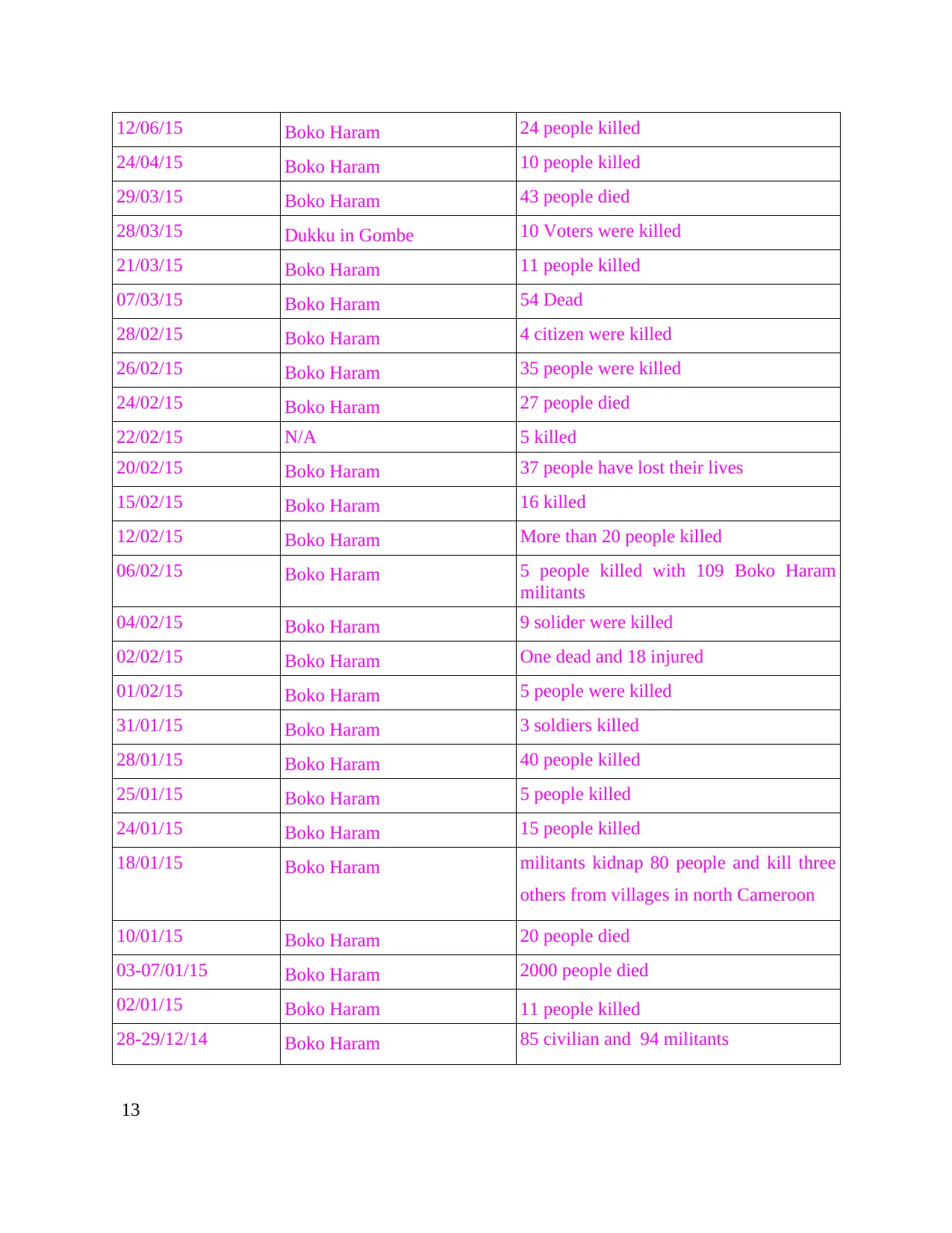
12/06/15 Boko Haram 24 people killed
24/04/15 Boko Haram 10 people killed
29/03/15 Boko Haram 43 people died
28/03/15 Dukku in Gombe 10 Voters were killed
21/03/15 Boko Haram 11 people killed
07/03/15 Boko Haram 54 Dead
28/02/15 Boko Haram 4 citizen were killed
26/02/15 Boko Haram 35 people were killed
24/02/15 Boko Haram 27 people died
22/02/15 N/A 5 killed
20/02/15 Boko Haram 37 people have lost their lives
15/02/15 Boko Haram 16 killed
12/02/15 Boko Haram More than 20 people killed
06/02/15 Boko Haram 5 people killed with 109 Boko Haram
militants
04/02/15 Boko Haram 9 solider were killed
02/02/15 Boko Haram One dead and 18 injured
01/02/15 Boko Haram 5 people were killed
31/01/15 Boko Haram 3 soldiers killed
28/01/15 Boko Haram 40 people killed
25/01/15 Boko Haram 5 people killed
24/01/15 Boko Haram 15 people killed
18/01/15 Boko Haram militants kidnap 80 people and kill three
others from villages in north Cameroon
10/01/15 Boko Haram 20 people died
03-07/01/15 Boko Haram 2000 people died
02/01/15 Boko Haram 11 people killed
28-29/12/14 Boko Haram 85 civilian and 94 militants
13
24/04/15 Boko Haram 10 people killed
29/03/15 Boko Haram 43 people died
28/03/15 Dukku in Gombe 10 Voters were killed
21/03/15 Boko Haram 11 people killed
07/03/15 Boko Haram 54 Dead
28/02/15 Boko Haram 4 citizen were killed
26/02/15 Boko Haram 35 people were killed
24/02/15 Boko Haram 27 people died
22/02/15 N/A 5 killed
20/02/15 Boko Haram 37 people have lost their lives
15/02/15 Boko Haram 16 killed
12/02/15 Boko Haram More than 20 people killed
06/02/15 Boko Haram 5 people killed with 109 Boko Haram
militants
04/02/15 Boko Haram 9 solider were killed
02/02/15 Boko Haram One dead and 18 injured
01/02/15 Boko Haram 5 people were killed
31/01/15 Boko Haram 3 soldiers killed
28/01/15 Boko Haram 40 people killed
25/01/15 Boko Haram 5 people killed
24/01/15 Boko Haram 15 people killed
18/01/15 Boko Haram militants kidnap 80 people and kill three
others from villages in north Cameroon
10/01/15 Boko Haram 20 people died
03-07/01/15 Boko Haram 2000 people died
02/01/15 Boko Haram 11 people killed
28-29/12/14 Boko Haram 85 civilian and 94 militants
13
Paraphrase This Document
Need a fresh take? Get an instant paraphrase of this document with our AI Paraphraser
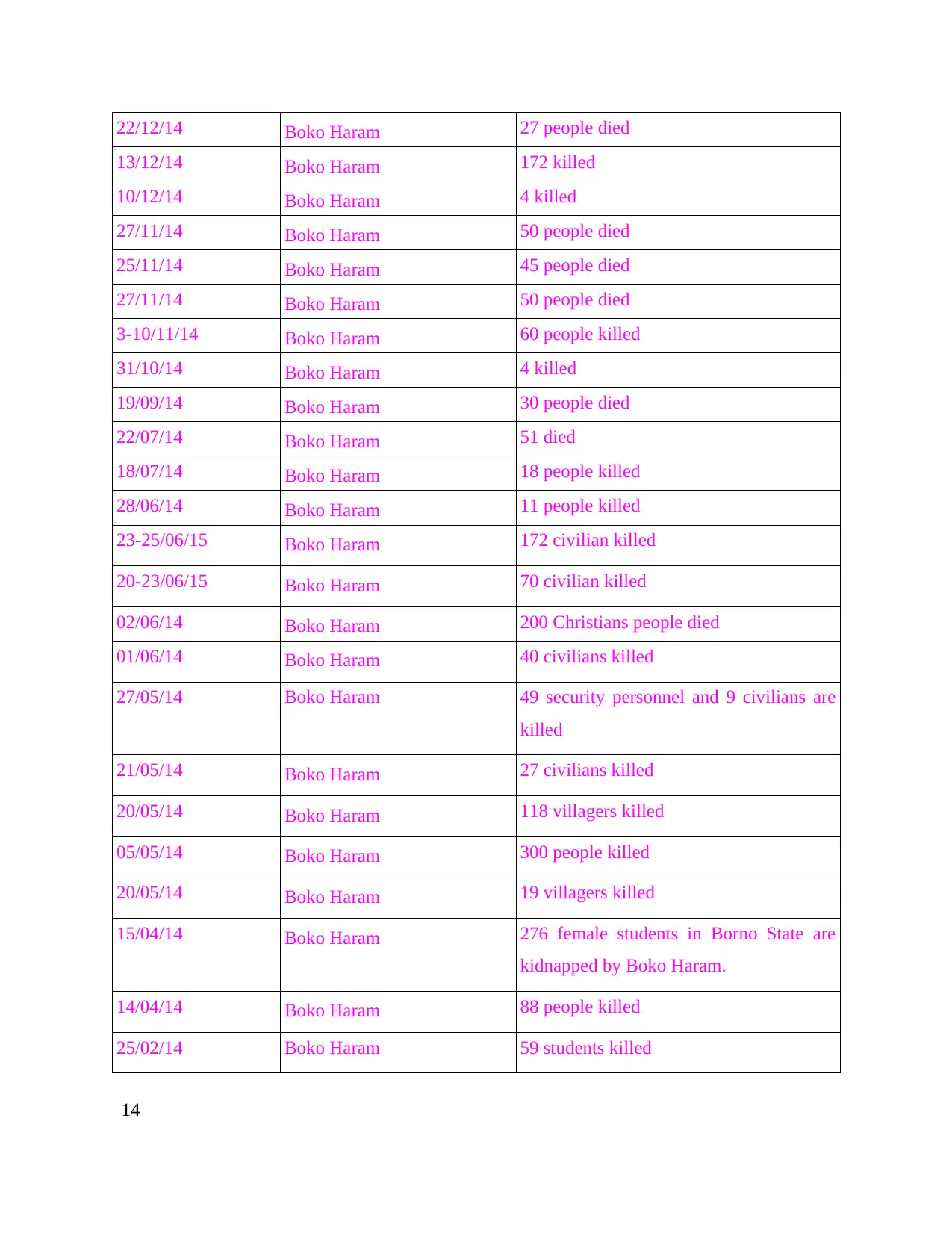
22/12/14 Boko Haram 27 people died
13/12/14 Boko Haram 172 killed
10/12/14 Boko Haram 4 killed
27/11/14 Boko Haram 50 people died
25/11/14 Boko Haram 45 people died
27/11/14 Boko Haram 50 people died
3-10/11/14 Boko Haram 60 people killed
31/10/14 Boko Haram 4 killed
19/09/14 Boko Haram 30 people died
22/07/14 Boko Haram 51 died
18/07/14 Boko Haram 18 people killed
28/06/14 Boko Haram 11 people killed
23-25/06/15 Boko Haram 172 civilian killed
20-23/06/15 Boko Haram 70 civilian killed
02/06/14 Boko Haram 200 Christians people died
01/06/14 Boko Haram 40 civilians killed
27/05/14 Boko Haram 49 security personnel and 9 civilians are
killed
21/05/14 Boko Haram 27 civilians killed
20/05/14 Boko Haram 118 villagers killed
05/05/14 Boko Haram 300 people killed
20/05/14 Boko Haram 19 villagers killed
15/04/14 Boko Haram 276 female students in Borno State are
kidnapped by Boko Haram.
14/04/14 Boko Haram 88 people killed
25/02/14 Boko Haram 59 students killed
14
13/12/14 Boko Haram 172 killed
10/12/14 Boko Haram 4 killed
27/11/14 Boko Haram 50 people died
25/11/14 Boko Haram 45 people died
27/11/14 Boko Haram 50 people died
3-10/11/14 Boko Haram 60 people killed
31/10/14 Boko Haram 4 killed
19/09/14 Boko Haram 30 people died
22/07/14 Boko Haram 51 died
18/07/14 Boko Haram 18 people killed
28/06/14 Boko Haram 11 people killed
23-25/06/15 Boko Haram 172 civilian killed
20-23/06/15 Boko Haram 70 civilian killed
02/06/14 Boko Haram 200 Christians people died
01/06/14 Boko Haram 40 civilians killed
27/05/14 Boko Haram 49 security personnel and 9 civilians are
killed
21/05/14 Boko Haram 27 civilians killed
20/05/14 Boko Haram 118 villagers killed
05/05/14 Boko Haram 300 people killed
20/05/14 Boko Haram 19 villagers killed
15/04/14 Boko Haram 276 female students in Borno State are
kidnapped by Boko Haram.
14/04/14 Boko Haram 88 people killed
25/02/14 Boko Haram 59 students killed
14
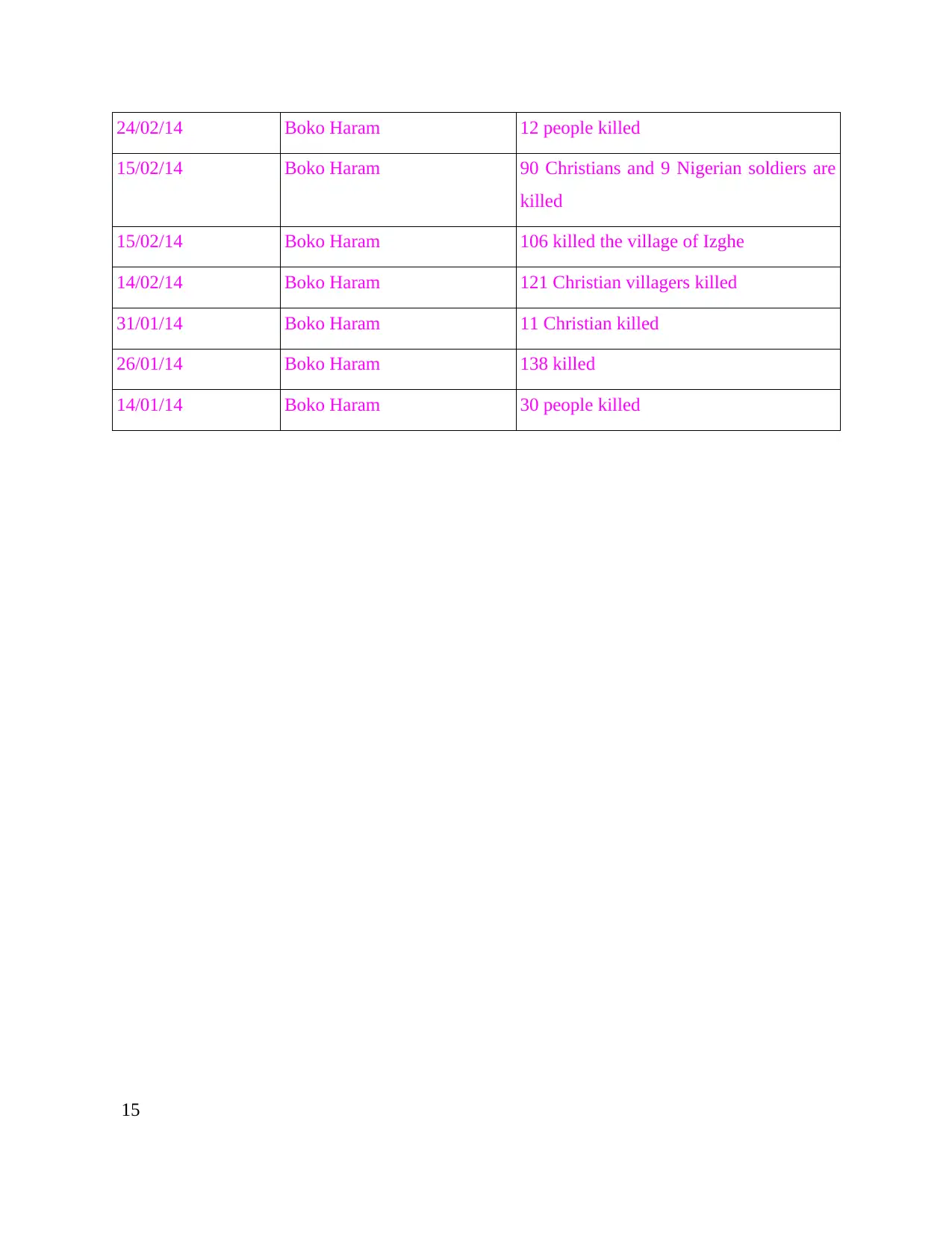
24/02/14 Boko Haram 12 people killed
15/02/14 Boko Haram 90 Christians and 9 Nigerian soldiers are
killed
15/02/14 Boko Haram 106 killed the village of Izghe
14/02/14 Boko Haram 121 Christian villagers killed
31/01/14 Boko Haram 11 Christian killed
26/01/14 Boko Haram 138 killed
14/01/14 Boko Haram 30 people killed
15
15/02/14 Boko Haram 90 Christians and 9 Nigerian soldiers are
killed
15/02/14 Boko Haram 106 killed the village of Izghe
14/02/14 Boko Haram 121 Christian villagers killed
31/01/14 Boko Haram 11 Christian killed
26/01/14 Boko Haram 138 killed
14/01/14 Boko Haram 30 people killed
15
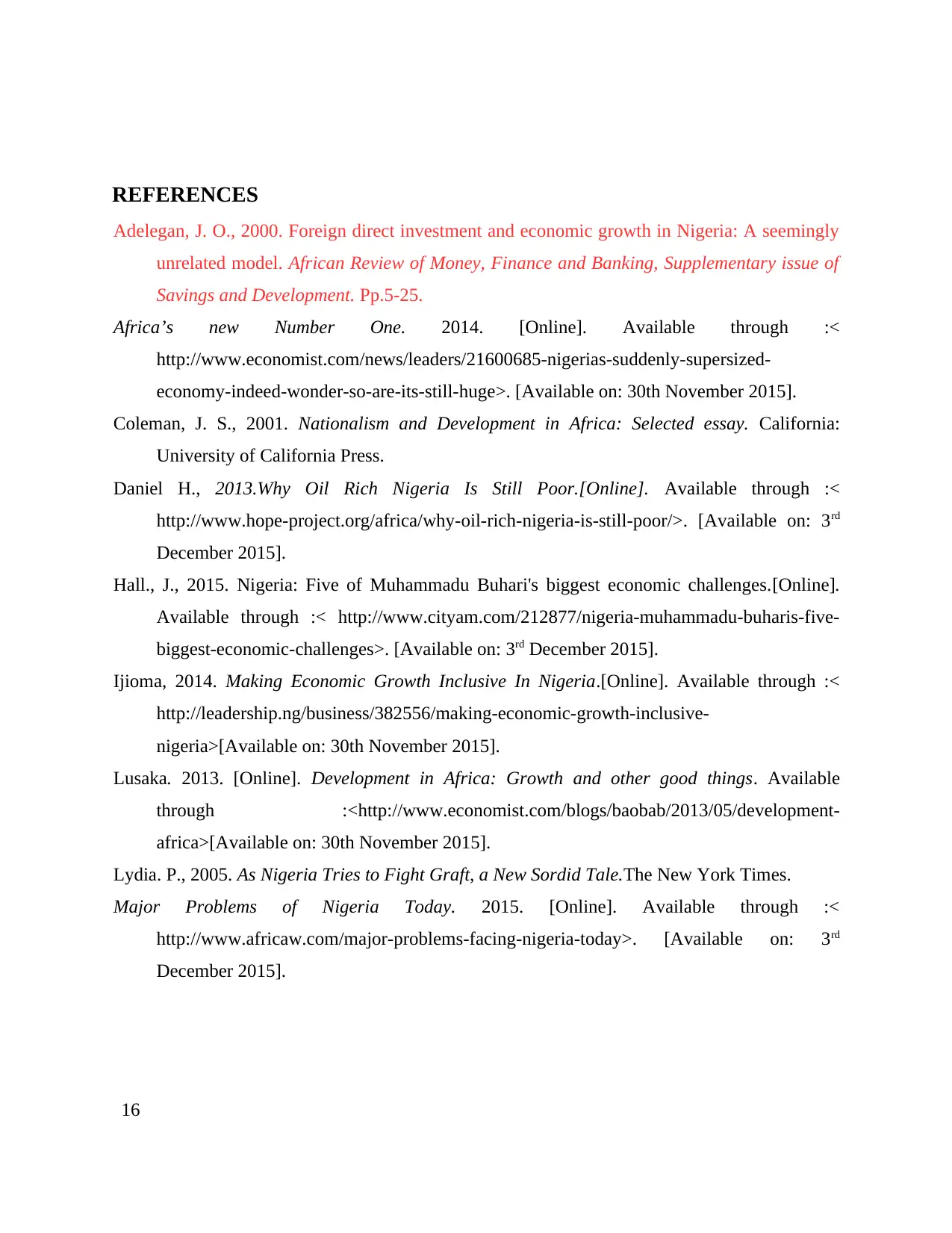
REFERENCES
Adelegan, J. O., 2000. Foreign direct investment and economic growth in Nigeria: A seemingly
unrelated model. African Review of Money, Finance and Banking, Supplementary issue of
Savings and Development. Pp.5-25.
Africa’s new Number One. 2014. [Online]. Available through :<
http://www.economist.com/news/leaders/21600685-nigerias-suddenly-supersized-
economy-indeed-wonder-so-are-its-still-huge>. [Available on: 30th November 2015].
Coleman, J. S., 2001. Nationalism and Development in Africa: Selected essay. California:
University of California Press.
Daniel H., 2013.Why Oil Rich Nigeria Is Still Poor.[Online]. Available through :<
http://www.hope-project.org/africa/why-oil-rich-nigeria-is-still-poor/>. [Available on: 3rd
December 2015].
Hall., J., 2015. Nigeria: Five of Muhammadu Buhari's biggest economic challenges.[Online].
Available through :< http://www.cityam.com/212877/nigeria-muhammadu-buharis-five-
biggest-economic-challenges>. [Available on: 3rd December 2015].
Ijioma, 2014. Making Economic Growth Inclusive In Nigeria.[Online]. Available through :<
http://leadership.ng/business/382556/making-economic-growth-inclusive-
nigeria>[Available on: 30th November 2015].
Lusaka. 2013. [Online]. Development in Africa: Growth and other good things. Available
through :<http://www.economist.com/blogs/baobab/2013/05/development-
africa>[Available on: 30th November 2015].
Lydia. P., 2005. As Nigeria Tries to Fight Graft, a New Sordid Tale.The New York Times.
Major Problems of Nigeria Today. 2015. [Online]. Available through :<
http://www.africaw.com/major-problems-facing-nigeria-today>. [Available on: 3rd
December 2015].
16
Adelegan, J. O., 2000. Foreign direct investment and economic growth in Nigeria: A seemingly
unrelated model. African Review of Money, Finance and Banking, Supplementary issue of
Savings and Development. Pp.5-25.
Africa’s new Number One. 2014. [Online]. Available through :<
http://www.economist.com/news/leaders/21600685-nigerias-suddenly-supersized-
economy-indeed-wonder-so-are-its-still-huge>. [Available on: 30th November 2015].
Coleman, J. S., 2001. Nationalism and Development in Africa: Selected essay. California:
University of California Press.
Daniel H., 2013.Why Oil Rich Nigeria Is Still Poor.[Online]. Available through :<
http://www.hope-project.org/africa/why-oil-rich-nigeria-is-still-poor/>. [Available on: 3rd
December 2015].
Hall., J., 2015. Nigeria: Five of Muhammadu Buhari's biggest economic challenges.[Online].
Available through :< http://www.cityam.com/212877/nigeria-muhammadu-buharis-five-
biggest-economic-challenges>. [Available on: 3rd December 2015].
Ijioma, 2014. Making Economic Growth Inclusive In Nigeria.[Online]. Available through :<
http://leadership.ng/business/382556/making-economic-growth-inclusive-
nigeria>[Available on: 30th November 2015].
Lusaka. 2013. [Online]. Development in Africa: Growth and other good things. Available
through :<http://www.economist.com/blogs/baobab/2013/05/development-
africa>[Available on: 30th November 2015].
Lydia. P., 2005. As Nigeria Tries to Fight Graft, a New Sordid Tale.The New York Times.
Major Problems of Nigeria Today. 2015. [Online]. Available through :<
http://www.africaw.com/major-problems-facing-nigeria-today>. [Available on: 3rd
December 2015].
16
Secure Best Marks with AI Grader
Need help grading? Try our AI Grader for instant feedback on your assignments.
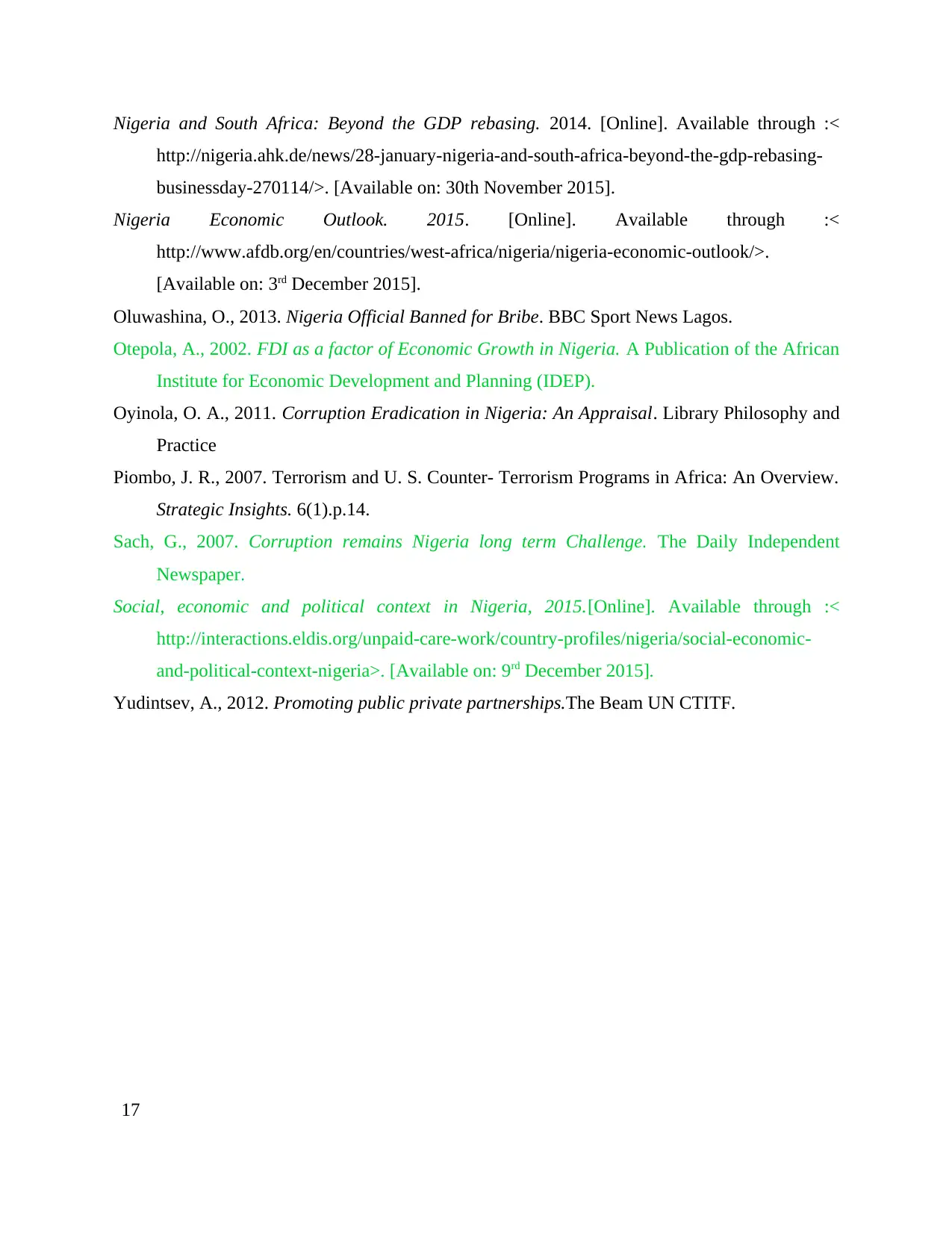
Nigeria and South Africa: Beyond the GDP rebasing. 2014. [Online]. Available through :<
http://nigeria.ahk.de/news/28-january-nigeria-and-south-africa-beyond-the-gdp-rebasing-
businessday-270114/>. [Available on: 30th November 2015].
Nigeria Economic Outlook. 2015. [Online]. Available through :<
http://www.afdb.org/en/countries/west-africa/nigeria/nigeria-economic-outlook/>.
[Available on: 3rd December 2015].
Oluwashina, O., 2013. Nigeria Official Banned for Bribe. BBC Sport News Lagos.
Otepola, A., 2002. FDI as a factor of Economic Growth in Nigeria. A Publication of the African
Institute for Economic Development and Planning (IDEP).
Oyinola, O. A., 2011. Corruption Eradication in Nigeria: An Appraisal. Library Philosophy and
Practice
Piombo, J. R., 2007. Terrorism and U. S. Counter- Terrorism Programs in Africa: An Overview.
Strategic Insights. 6(1).p.14.
Sach, G., 2007. Corruption remains Nigeria long term Challenge. The Daily Independent
Newspaper.
Social, economic and political context in Nigeria, 2015.[Online]. Available through :<
http://interactions.eldis.org/unpaid-care-work/country-profiles/nigeria/social-economic-
and-political-context-nigeria>. [Available on: 9rd December 2015].
Yudintsev, A., 2012. Promoting public private partnerships.The Beam UN CTITF.
17
http://nigeria.ahk.de/news/28-january-nigeria-and-south-africa-beyond-the-gdp-rebasing-
businessday-270114/>. [Available on: 30th November 2015].
Nigeria Economic Outlook. 2015. [Online]. Available through :<
http://www.afdb.org/en/countries/west-africa/nigeria/nigeria-economic-outlook/>.
[Available on: 3rd December 2015].
Oluwashina, O., 2013. Nigeria Official Banned for Bribe. BBC Sport News Lagos.
Otepola, A., 2002. FDI as a factor of Economic Growth in Nigeria. A Publication of the African
Institute for Economic Development and Planning (IDEP).
Oyinola, O. A., 2011. Corruption Eradication in Nigeria: An Appraisal. Library Philosophy and
Practice
Piombo, J. R., 2007. Terrorism and U. S. Counter- Terrorism Programs in Africa: An Overview.
Strategic Insights. 6(1).p.14.
Sach, G., 2007. Corruption remains Nigeria long term Challenge. The Daily Independent
Newspaper.
Social, economic and political context in Nigeria, 2015.[Online]. Available through :<
http://interactions.eldis.org/unpaid-care-work/country-profiles/nigeria/social-economic-
and-political-context-nigeria>. [Available on: 9rd December 2015].
Yudintsev, A., 2012. Promoting public private partnerships.The Beam UN CTITF.
17
1 out of 17
Related Documents
Your All-in-One AI-Powered Toolkit for Academic Success.
+13062052269
info@desklib.com
Available 24*7 on WhatsApp / Email
![[object Object]](/_next/static/media/star-bottom.7253800d.svg)
Unlock your academic potential
© 2024 | Zucol Services PVT LTD | All rights reserved.





